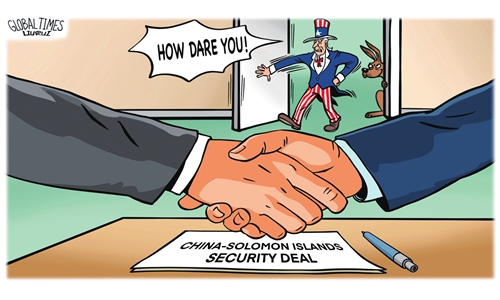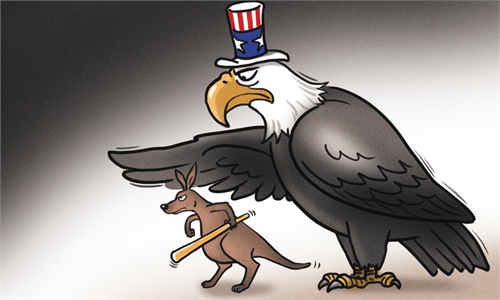
Illustration: Liu Rui/GT
Editor's Note:The framework agreement on security cooperation between China and the South Pacific island country of the Solomon Islands has sent unwarranted shock waves to Australia and the US. How to understand such reaction? What does such a reaction reflect when South Pacific Island countries have more choices for development and security cooperation? Global Times (GT) reporter Wang Wenwen talked to James Laurenceson (Laurenceson), director of the Australia-China Relations Institute, University of Technology Sydney, over these issues.
GT: You commented on Twitter that Australia should start with recognizing the world has changed and that it doesn't enjoy the relative power privileges it did previously, and admitting that the state of its own relationship with Beijing marks Australia out as an outlier in the region. What prevented Australia from keeping pace with this changing world?
Laurenceson: It is entirely unsurprising that Beijing will seek to move along a path in its relations with foreign countries that expand its options. That's Diplomacy 101. That a deal has been struck with a country that causes particular alarm to Canberra might have given Beijing's diplomatic efforts particular vigor in view of the political falling out with Canberra over the last few years. This is where an awareness of the outlier status of Australia's official bilateral relations with China comes into it. Basically, every other capital in the region has recognized that allowing its ties with Beijing to drift into an adversarial stance is completely counter-productive for maximizing opportunities and minimizing risks. Now, from the perspective of the Solomon Islands, in 2020 the value of goods exported to China was 72 times that to Australia. Fundamentally, that reflects China's economic rise and the degree of economic complementarity between the two countries. Why would Honiara not have some interest in broadening its relationship with by far its biggest trading partner, particularly given its overwhelming strategic exposure to Australia to date? Again, it's about expanding options and so the point is that what's happening here isn't some left-field development and any imagination in Canberra that somehow such engagement between China and a third country could be prevented or blocked is bizarre. Rather than recognizing the way the world has changed, some analysts appear to have fixated on the decades immediately after WW2 and concluded that this represents some immutable international order. It's a deeply flawed analysis.
GT: How does the mindset of power privileges affect Australia's foreign policymaking? The Morrison government cited "security concerns" for the China-Solomons deal. But it signed the AUKUS deal with the US and UK with a clear aim of targeting China, which also triggered a sense of insecurity in the region. Do you take it as a reflection of the mindset of power privileges of Australia as well as the US?
Laurenceson: There are security concerns for Canberra from the China-Solomon Islands deal. I'm not suggesting there aren't or that Canberra must just passively welcome the deal. Beijing has not passively welcomed the AUKUS deal, the Quad grouping or closer Australia-Japan defense collaboration and so on, because there are security concerns for China from these arrangements. And so the point for Canberra and Beijing is whether they can recognize how their own actions, and the state of disrepair the bilateral political relationship is in, are feeding into this insecurity spiral. Nothing good can come from the current trajectory unless you are an ideologue, ethno-nationalist or weapons manufacturer.
GT: Some Australian experts believe Australia did not engage with South Pacific island countries enough (such as ignoring their reaction to Australia's aid cuts and its weak climate target) but only viewed them as its backyard to serve its geostrategic ambition in the region. This seems to echo your view that the state of Australia's relationship with Beijing marks it out as an outlier in the region. Can you further elaborate?
Laurenceson: There's no doubt that past Australian actions whether it be inaction on climate change, colonial condescension, programs of espionage and so on have reduced its influence in the region and contributed to an interest by Pacific Islands in diversifying their strategic options. Similarly, Beijing's actions will generate a local response that might limit its influence too. For example, if Chinese investment benefits Chinese companies and elites in these countries rather than the broader population, it will generate a domestic backlash.
GT: The US closed its embassy in the Solomon Islands in 1993, and only planned to reopen it in February. Did the US attach enough significance to the South Pacific? When South Pacific Island countries have more choice for development and security cooperation, does it serve their interests more?
Laurenceson: It's difficult to argue that fewer options for Pacific Island countries are better than more. And indeed, there's now more resources flowing to Pacific Island countries because of competition among the bigger powers for their attention. There are limits though. If bigger powers actively seek to exploit domestic political divisions to the point that the social fabric starts breaking down, this will be a tragedy.
GT: After China and the Solomon Islands signed the deal, two top US officials on Asia led a delegation traveling this week to the Solomon Islands, Fiji and Papua New Guinea. Some observers worry that the South Pacific may be dragged into geopolitics. What's your take on this?
Laurenceson: That they are being dragged into geopolitics is a foregone conclusion. But so far, my impression is that they are refusing to "pick a side" and for the most part are retaining their own agency and sovereignty. That's not a bad outcome as the geopolitics heats up.
GT: What policy adjustment will Australia make regarding South Pacific Island countries? Some worry that these countries may be forced to pick a side. What's your view?
Laurenceson: The big lesson I've taken from the work of leading scholars like Evelyn Goh, Courtney Fung and Joanne Wallis is that the ability of bigger powers to influence smaller ones is more limited than commonly imagined. For this reason I doubt the capacity of the US and its allies, as well as China, to force Pacific Island countries to "pick a side." The policy adjustments Australia will need to make are the same as those that China will need to if it wants to maximize influence: engage with the population of these countries on their own terms, taking their interests as the starting point rather than seeing them through the frame of being pawns in a grand geopolitical game.


